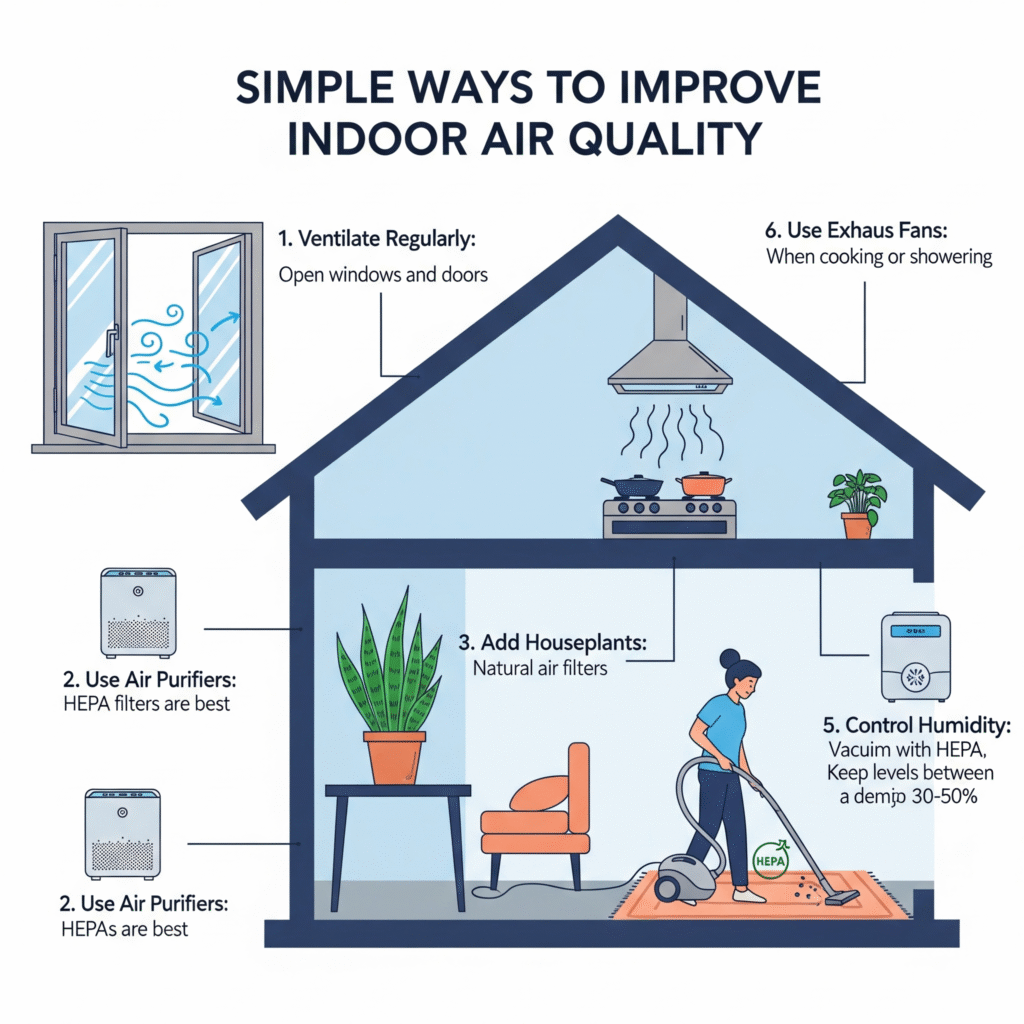We often focus on outdoor pollution, but indoor air quality is just as important for our health. People spend most of their time indoors — at home, in school, or at work — so the air we breathe inside matters greatly. Poor indoor air quality can cause allergies, asthma, headaches, and long-term respiratory issues.
The good news? With a few smart steps, you can make your indoor environment cleaner, fresher, and healthier. Here are some easy ways to improve the air you breathe at home.
1. Keep Your Home Clean
Dust, pet dander, and pollen can build up indoors and lower air quality.
- Vacuum carpets and rugs regularly using a HEPA filter vacuum.
- Wipe surfaces with a damp cloth to prevent dust from flying into the air.
- Wash bedding weekly to remove dust mites.
Tip: A clean home is the first step toward healthier air.
2. Ventilate Your Rooms
Fresh air circulation is key to removing stale indoor air.
- Open windows for a few minutes each day when outdoor AQI is good.
- Use exhaust fans in kitchens and bathrooms to remove humidity and odors.
When outdoor pollution is high, keep windows closed and use indoor air purifiers instead. You can check real-time AQI on <a href=”https://aidailydash.com” class=”cmenu-link”>aidailydash</a> to decide the best time to ventilate.
3. Use Air Purifiers
Air purifiers help remove dust, allergens, and even harmful chemicals from the air.
- Choose a purifier with a HEPA filter for best results.
- Place it in the room where you spend the most time, such as your bedroom or living room.
4. Add Indoor Plants
Certain plants naturally filter toxins from the air.
- Popular options include snake plants, spider plants, and peace lilies.
- They also add beauty and freshness to your home.
Tip: Avoid overwatering plants, as damp soil can grow mold.
5. Control Humidity Levels
High humidity can promote mold growth, while low humidity can cause dry skin and throat irritation.
- Use a dehumidifier in damp areas.
- Use a humidifier in dry seasons to maintain comfortable moisture levels.
Ideal indoor humidity is between 30–50%.
6. Avoid Indoor Smoking and Strong Chemicals
Cigarette smoke is one of the biggest indoor pollutants.
- Make your home a smoke-free zone.
- Limit the use of strong chemical cleaners, sprays, and air fresheners — choose natural alternatives instead.
7. Maintain Appliances
Poorly maintained heating, ventilation, and air conditioning (HVAC) systems can spread dust and pollutants.
- Clean air filters regularly.
- Schedule annual maintenance for your HVAC system.
Why Indoor Air Quality Matters
Breathing clean indoor air can:
- Reduce the risk of allergies and respiratory problems
- Improve sleep quality
- Boost overall health and well-being
By taking small steps, you can protect your family’s health and create a safer indoor environment.
Conclusion
Improving indoor air quality doesn’t require big changes — just consistent habits. Keep your home clean, ventilate wisely, use plants and purifiers, and maintain the right humidity.
Stay informed about outdoor AQI with <a href=”https://aidailydash.com” class=”cmenu-link”>aidailydash</a> so you know when it’s safe to let in fresh air. Your lungs will thank you for every breath of clean, fresh air.

